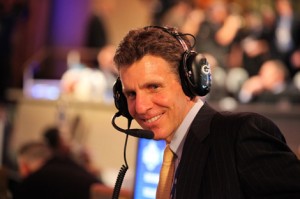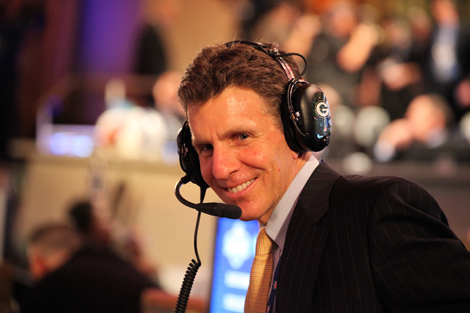The following “Six Questions” short interview with Andrew Brandt, NFL Business Analyst at ESPN, was conducted by Belmont University Law School student and aspiring sports/entertainment agent Mark J. Burns. Connect with Andrew on Linkedin and Twitter.

1. When did you first realize you wanted to work in sports? What were some of your first internships/experiences and what lessons did you take away from those?
I grew up in Washington, DC a die-hard Redskin and Bullets fan, going to both games as often as possible. I always thought about marrying my interest in sports and whatever avocation I chose; it happened to be law. Fortunately for me, going to law school at Georgetown in DC allowed me to intern first for the NFLPA and then for ProServ Inc, a major sports management and marketing firm that gave me great experience. I continued to work for ProServ — and agent David Falk — for five years following graduation from law school.
2. As a current NFL Business Analyst with ESPN, what are your day-to-day responsibilities? As a follow-up, how do you utilize social media to enhance what you do?
ESPN contacts me when they need me, usually around deeper issues in sports such as recent topics like concussions and now the problems in Miami. There is no set schedule; some weeks there is no use, some weeks I am used 4-5 times. I also write a weekly column on the business of football for a new website, Peter King’s TheMMQB.com, where there is always compelling content. And that is just my media side; I have two academic jobs: a lecturer at Wharton School of Business and Director of the Moorad Center for Sports Law at Villanova Law School.
Social media, mainly Twitter, has allowed me to find an audience with some of my differentiated nuggets of content, some from my experiences with the Packers, some from my legal background, some from my agent background, some from my academic background, etc. It has also been a good place for me to express myself and coin phrases such as “There will be lawyers” and my many translations.
3. At one point in time, you were a sports agent. You also spent nine years in management with the Green Bay Packers. How did being a sports agent help you in your position with the Packers?
My experience as an agent was invaluable, allowing me to know exactly what the other side was thinking and often moving past a lot of the BS and chatter that hold up negotiations. I also understood the value of agents as buffers between the team and the player and the importance of developing and maintaining good relationships with them.
4. What are 3 to 5 essential and tangible skills necessary to work in the sports industry?
An ability to be even-keeled and calm amidst stressful times; an ability to see the situation from your counterpart’s point of view; an ability to listen — say less, listen more.
5. What is the most rewarding aspect of your position with ESPN?
Whether ESPN, Sports Illustrated or teaching, what I enjoy most is taking potentially difficult, complex and dense topics and making them understandable to a wider audience. I know I’m not curing cancer, but I am trying to use this part of my life to “give back” knowledge that I have learned through experience.
6. In 75 words or less, what advice would you give to aspiring sports business professionals?
Find a special skill that separates you from the pack. Every aspiring person says they love sports and are willing to work hard; that is not enough. Find something that makes you different and be able to communicate that differentiated skill clearly and concisely. People are impressed by those who stand out among the crowd.
